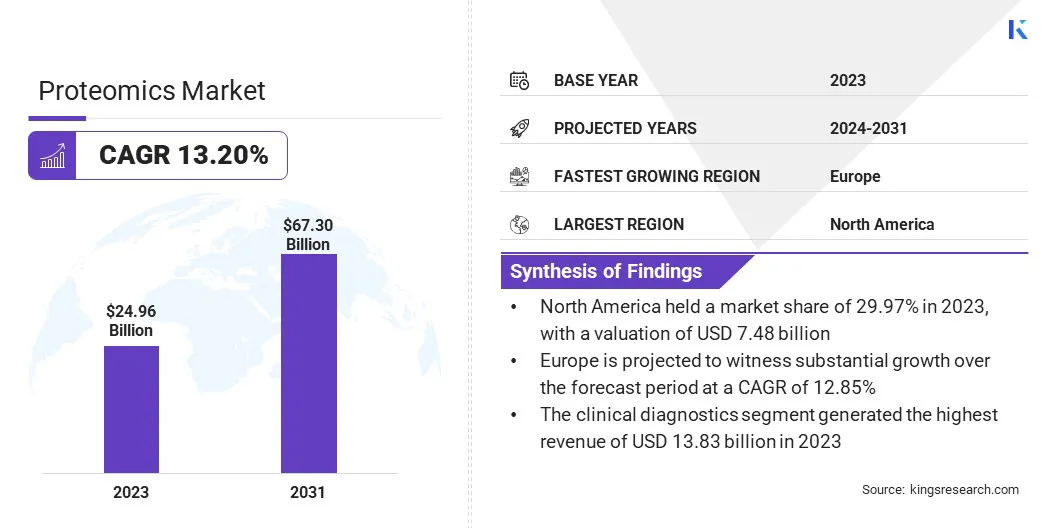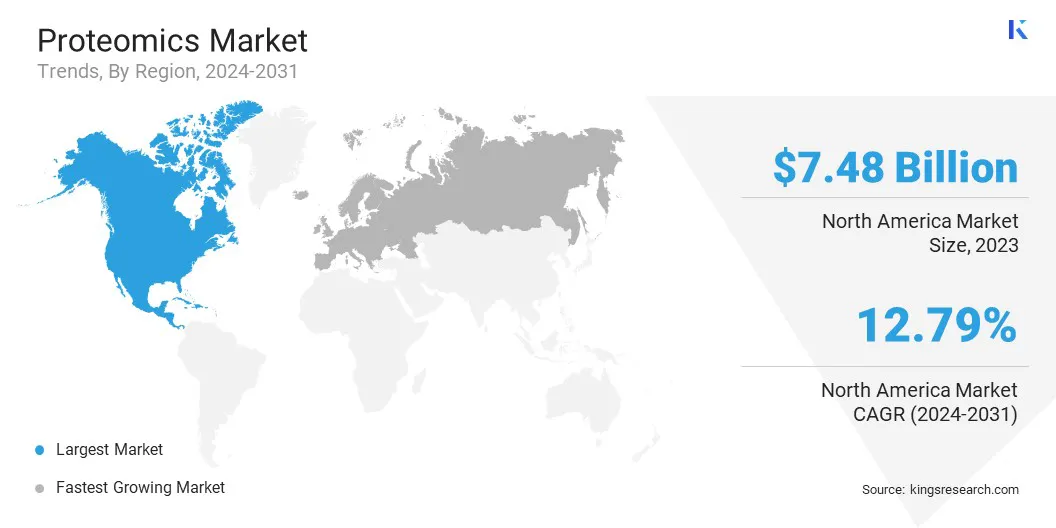Proteomics Market Size
The global Proteomics Market size was valued at USD 24.96 billion in 2023 and is projected to reach USD 67.30 billion by 2031, growing at a CAGR of 13.20% from 2024 to 2031. In the scope of work, the report includes products offered by companies such as Thermo Fisher Scientific Inc., Agilent Technologies, Inc., Merck KGaA, Danaher Corporation, GE Healthcare, PerkinElmer Inc., Waters Corporation, Bio-Rad Laboratories, Inc., Bruker Corporation, Illumina, Inc. and others.
Advancements in instrumentation technology are playing a pivotal role in propelling market growth. With the continual development of cutting-edge instruments such as mass spectrometers, protein microarrays, and high-throughput analytical platforms, researchers are able to analyze proteins with unprecedented sensitivity, speed, and accuracy.
These technological advancements enable the comprehensive characterization of complex protein mixtures, the clarification of protein structures and functions, and the identification of protein-protein interactions and post-translational modifications. Moreover, the increasing prevalence of chronic diseases worldwide has led to a growing demand for proteomic diagnostics.
Chronic diseases such as cancer, cardiovascular diseases, diabetes, and neurological disorders are imposing a significant burden on global healthcare systems, underscoring the need for early detection, accurate diagnosis, and personalized treatment approaches. Proteomic diagnostics offer unique advantages for identifying disease-specific biomarkers, monitoring disease progression, and predicting treatment responses based on individual molecular profiles.
By analyzing patterns of protein expression, post-translational modifications, and interactions within biological samples, proteomic assays provide valuable insights into disease mechanisms and facilitate the development of targeted therapies. Due to the increasing aging population and incidence of chronic diseases, the demand for innovative proteomic diagnostic solutions is increasing, which is contributing significantly to market growth.
Proteomics is the comprehensive study of proteins, encompassing their structure, function, interactions, and dynamics within biological systems. It plays a crucial role in various application areas, including clinical diagnostics, drug discovery, personalized medicine, agriculture, environmental monitoring, and research.
Technological advancements such as mass spectrometry, protein microarrays, and bioinformatics tools are revolutionizing proteomics by enabling high-throughput analysis of complex protein samples with unprecedented sensitivity and accuracy. These advancements are facilitating the identification of disease biomarkers, clarification of signaling pathways, and discovery of potential drug targets.

Analyst’s Review
In the competitive landscape of the global proteomics market, key players are focusing on investing in research and development to innovate new proteomics technologies. Forging strategic partnerships and collaborations with academic institutions, pharmaceutical companies, and healthcare providers is facilitating access to complementary expertise, resources, and market channels, thereby accelerating the product development and commercialization process.
Moreover, industry players are focusing on leveraging customer-centric approaches by providing comprehensive solutions, technical support, and value-added services to enhance customer satisfaction and foster loyalty.
Additionally, utilizing data analytics and artificial intelligence tools to extract actionable insights from proteomic data is presenting new opportunities for biomarker discovery, drug development, and precision medicine. These strategies enable companies to navigate the dynamic market landscape and position them for sustained growth and profitability in the global marketplace.
Proteomics Market Growth Factors
The growing focus on personalized medicine is diversifying the applications of proteomics in healthcare and life sciences. Personalized medicine aims to tailor medical treatments to individual patient characteristics, including genetic makeup, lifestyle factors, and molecular profiles.
Proteomics plays a significant role in personalized medicine approaches by providing insights into the unique protein signatures associated with disease susceptibility. By analyzing protein expression patterns, post-translational modifications, and interactions within patient samples, proteomic assays help identify predictive biomarkers for disease diagnosis and prognosis.
This approach enables clinicians to make informed decisions regarding patient care and improve clinical outcomes. With the growing recognition of the importance of personalized medicine in delivering more effective and precise healthcare interventions, the demand for proteomic technologies and services is expected to rise.
However, data analysis bottlenecks pose significant challenges for proteomics data interpretation, hindering the extraction of meaningful insights from complex datasets. Proteomics experiments often generate vast amounts of raw data, including spectra from mass spectrometry and images from protein microarrays, which require sophisticated computational tools and algorithms for processing, analysis, and interpretation.
However, the complexity and heterogeneity of proteomic data present challenges in terms of data integration, quality control, and statistical analysis, which often lead to false positives, false negatives, and data inconsistencies. To overcome these challenges, researchers are increasingly adopting advanced bioinformatics approaches, machine learning algorithms, and cloud-based computing platforms for proteomic data analysis.
These technologies enable automated data processing, quality assessment, and result validation, thereby streamlining analytical workflows and enhancing the reproducibility and reliability of proteomic studies. Moreover, standardization efforts, community-driven initiatives, and data-sharing platforms facilitate collaboration across the proteomics community.
Proteomics Market Trends
The notable shift toward multiplexed assays for simultaneous analysis of multiple proteins is shaping the proteomics industry outlook. Multiplexed assays enable researchers to analyze multiple proteins in a single experiment, offering advantages such as higher throughput, reduced sample consumption, and enhanced efficiency.
The growing demand for comprehensive profiling of protein biomarkers and molecular pathways in various biological samples has been a significant factor fueling this trend in recent years. Similarly, single-cell proteomics techniques enable the characterization of protein expression profiles at the single-cell level, providing insights into cellular heterogeneity, cell-to-cell variability, and dynamic changes in protein abundance and localization.
This trend is further fueled by the increasing recognition of the importance of cellular diversity in physiological and pathological processes, as well as the need for more precise and context-specific molecular insights for personalized medicine and targeted therapies. These trends are expected to drive innovation and adoption of advanced proteomic technologies and methodologies, thereby driving market growth.
Segmentation Analysis
The global proteomics market is segmented based on product & services, application, and geography.
By Product & Services
Based on product & services, the market is segmented into reagent, instrument technology, and software & services. The instrument technology segment acquired the largest market share of 64.7% in 2023. Instrument technology encompasses a wide range of instruments and equipment used for proteomic analysis, including mass spectrometers, protein microarrays, chromatography systems, and electrophoresis platforms.
Ongoing technological advancements in instrument design, performance, and automation contribute to continuous improvements in proteomic workflows, data quality, and analytical capabilities, thereby reinforcing the dominance of the instrument technology segment in the market.
By Application
Based on application, the market is classified into clinical diagnostics, drug discovery, and others. The clinical diagnostics segment generated the highest revenue of USD 13.83 billion in 2023.
Clinical diagnostics play a critical role in healthcare by enabling the early detection, accurate diagnosis, and monitoring of various diseases and disorders. Proteomic diagnostics offer unique advantages for clinical applications, such as the identification of disease-specific biomarkers, assessment of disease progression, and prediction of treatment responses based on individual molecular profiles.
With the increasing prevalence of chronic diseases, the aging population, and the growing demand for personalized medicine, the demand for innovative proteomic diagnostic solutions that provide accurate, reliable, and actionable information is rising. As a result, the clinical diagnostics segment experiencing significant growth in the proteomics market.
Proteomics Market Regional Analysis
Based on region, the global proteomics market is classified into North America, Europe, Asia-Pacific, MEA, and Latin America.

The North America Proteomics Market share stood around 29.97% in 2023 in the global market, with a valuation of USD 7.48 billion. The region boasts a prospering biotechnology and pharmaceutical industry, extensive academic and research institutions, and a supportive regulatory environment. Moreover, the increasing prevalence of chronic diseases, growing adoption of personalized medicine, and rising demand for advanced diagnostic solutions are fostering regional market growth.
Additionally, strategic partnerships, mergers, and acquisitions among key players in the region are contributing to market expansion. With ongoing advancements in proteomic technologies, increasing emphasis on precision medicine, and rising healthcare expenditure, North America is poised to grow significantly in the upcoming years.
Europe is projected to witness substantial growth over the forecast period at a CAGR of 12.85%. Increasing investment in proteomic research and development is fostering regional market growth. The region benefits from its strong scientific base, collaborative research networks, and supportive government initiatives, which are facilitating innovation in proteomics.
Moreover, the European Union's regulatory framework promotes the development and adoption of proteomic technologies for healthcare applications, thereby providing lucrative opportunities for companies operating in the region. With a focus on addressing unmet medical needs, improving healthcare outcomes, and driving technological innovation, Europe is expected to emerge as a key market for proteomics over the forecast years.
Competitive Landscape
The global proteomics market report will provide valuable insight with an emphasis on the fragmented nature of the industry. Prominent players are focusing on several key business strategies such as partnerships, mergers and acquisitions, product innovations, and joint ventures to expand their product portfolio and increase their market shares across different regions.
Strategic initiatives, including investments in R&D activities, the establishment of new manufacturing facilities, and supply chain optimization, are foreseen to create new opportunities for market growth.
List of Key Companies in Proteomics Market
Key Industry Developments
- April 2024 (Partnership): Biognosys and Alamar Biosciences partnered to advance proteomics research in biopharma and precision medicine. This collaboration was aimed to combine Biognosys' expertise in proteomics solutions with Alamar's proficiency in biomarker discovery and validation. The integration of their capabilities was anticipated to accelerate the development of innovative tools and technologies for protein analysis, thereby enhancing drug discovery, development, and personalized medicine research.
- September 2023 (Partnership): Eurofins Genomics, a global leader in genomic services, partnered with Olink Proteomics, a provider of protein biomarker discovery solutions. This collaboration was aimed to advance proteomics research by combining Eurofins' expertise in genomics with Olink's innovative protein analysis technologies. The partnership was anticipated to facilitate comprehensive analysis of both genomic and proteomic data, enabling researchers to gain deeper insights into biological mechanisms and disease pathways, thus enhancing drug discovery and personalized medicine efforts.
The Global Proteomics Market is Segmented as:
By Product & Services
- Reagent
- Instrument Technology
- Software & Services
By Application
- Clinical Diagnostics
- Drug Discovery
- Other
By Region
- North America
- Europe
- France
- U.K.
- Spain
- Germany
- Italy
- Russia
- Rest of Europe
- Asia-Pacific
- China
- Japan
- India
- South Korea
- Rest of Asia-Pacific
- Middle East & Africa
- GCC
- North Africa
- South Africa
- Rest of Middle East & Africa
- Latin America
- Brazil
- Argentina
- Rest of Latin America


